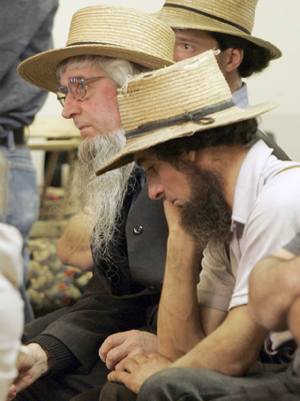 We can learn a lot by looking back on the fifth anniversary of the Amish schoolhouse shootings, to the striking actions of the Amish community following the murders when they immediately expressed forgiveness to the shooter’s family.
We can learn a lot by looking back on the fifth anniversary of the Amish schoolhouse shootings, to the striking actions of the Amish community following the murders when they immediately expressed forgiveness to the shooter’s family.
This was not forgiveness offered in a prepared statement, delivered by lawyers or news crews, but forgiveness offered in person, from one human being to another.
What the Amish consider to be “standard Christian forgiveness” can teach all of us — in our own personal and political conflicts — that forgiveness is a way of life learned and lived in community.
Over the past five years in this quiet, rural community in Lancaster County, the survivors of the tragedy have had to wrestle with the impact that Oct. 2, 2006, has had on their lives and their understanding of the world. Four of the five wounded girls have physically recovered; the fifth suffers from permanent disabilities due to brain trauma. The entire community continues to wrestle with the emotional and mental terror of the day.
A beautifully crafted book, “Amish Grace: How Forgiveness Transcended Tragedy,” appeared a year after the tragedy and provided a rich context to understand the shooting and the community’s response. The authors distinguish the Amish understanding of forgiveness from some of the ways it was misunderstood. For example, the Amish were not offering cheap forgiveness as a form of pardon. Had the shooter not killed himself, they would have advocated punishment for his actions, even as they offered forgiveness as a way of living into the future.
They were not only using words but also gestures of forgiveness, attending Mr. Roberts’ funeral and setting aside some of the approximately $4 million they received from well-wishers as a gift for the Roberts family, with a special concern for the shooter’s children.
How do the Amish create and sustain a community of forgiveness?
Second, forgiveness emerges most authentically out of a community’s way of life. Part of what seemed astounding was how quickly the whole Amish community expressed a commitment to forgiveness. Some members of the media wondered whether there had been a called meeting to decide to offer forgiveness. But the “instantaneous” decision did not come out of a meeting, nor did it emerge out of nowhere; rather, it was the natural response of people whose daily habits reflect a commitment to forgiveness.
 Third, forgiveness and healing are discovered by reaching out to others. Amish families have discovered this in relationships forged with the Roberts family. Even more, members of the Nickel Mines community have engaged the wider world in new ways. They have welcomed delegations from around the world who are struggling to recover from their own tragedies. Surprisingly, given their rootedness, members of the Nickel Mines community have traveled to Virginia Tech and to a community in New Hampshire to offer support and encouragement in the wake of tragedies. On the trip to New Hampshire, Terri Roberts, the shooter’s mother, accompanied the Amish parents to bear witness to the possibilities for new life and new relationships in the wake of a tragedy’s brokenness and divisions.
Third, forgiveness and healing are discovered by reaching out to others. Amish families have discovered this in relationships forged with the Roberts family. Even more, members of the Nickel Mines community have engaged the wider world in new ways. They have welcomed delegations from around the world who are struggling to recover from their own tragedies. Surprisingly, given their rootedness, members of the Nickel Mines community have traveled to Virginia Tech and to a community in New Hampshire to offer support and encouragement in the wake of tragedies. On the trip to New Hampshire, Terri Roberts, the shooter’s mother, accompanied the Amish parents to bear witness to the possibilities for new life and new relationships in the wake of a tragedy’s brokenness and divisions.
Finally, laughter is healing. As time has passed, the Amish community has discovered that laughter heals and offers hope. It took one Amish couple almost two years to be able to find laughter again, but once they did they discovered they had made a significant turn in their healing.
Five years later, the journey continues in Nickel Mines. It continues in Blacksburg, Va.; Tucson, Ariz.; and Utoya, Norway. The need for rich understandings and practices of forgiveness is, regrettably, no less urgent today than it was five years ago. Rather than worlds colliding in bizarre ways, we can hope to discover afresh what others — even those who seem strange to us — have to teach.
L. Gregory Jones, a professor of theology at Duke Divinity School, is the author of “Embodying Forgiveness” and co-author of “Forgiving as We’ve Been Forgiven.” His email is l.gregory.jones@duke.edu




















[…] Living Forgiveness: Lessons on the Anniversary of the Amish School Shootings […]